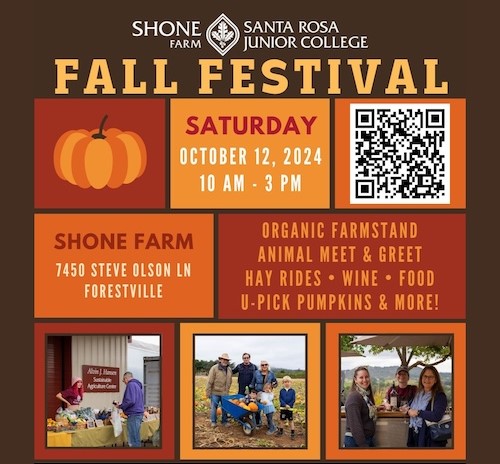Sonoma County’s Shone Farm a Crucial Hub for Agriculture
By Virginie Boone
The annual Shone Farm Fall Festival takes place this Saturday, October 12 from 10 a.m. to 3 p.m. in Forestville, with hay rides, u-pick pumpkins, an organic vegetable and flower farm stand, rotten fruit slingshot, tractor show-and-tell, and a very popular animal meet and greet with resident cows, goats and sheep, including baby lambs expected to be born in time to join the fun.
A food court with food by Food for Thought, Sebastopol Future Farmers and Black Piglet, among others, and wine tasting, are also part of the day’s festivities, with a chance to learn more about the Santa Rosa Junior College (SRJC) Wine Studies program.
An outdoor learning lab with 120 acres of forest, 100 acres of pasture, 91 acres of vineyard, 12 acres for producing crops and 4 acres of olives and apple trees, Shone Farm has been a crucial agricultural outpost of the SRJC since 1972, offering hands-on experience in the heart of Sonoma County’s Russian River Valley.
The land we know today as Shone Farm was a military listening post belonging to the U.S. Navy during World War II and declared surplus land by the federal government in 1972, when it was acquired by SRJC. It was one of the first community colleges in California to receive a National Science Foundation grant to promote sustainability and sustainable agriculture education.
Its namesake, poultry rancher Robert A. Shone, was a former president of the Sonoma County Farm Bureau and SRJC trustee from 1954-1967 who once served as president of the Poultry Producers of Central California, a farmers’ cooperative. Having started his poultry career in 1928 producing eggs on a ranch near the Washoe House in Petaluma, followed by raising meat birds in 1936, Shone died in 1993 at the age of 85.
Shone Farm continues to thrive with the support of Sonoma County’s wider agricultural community, who support and guide the SRJC Foundation’s Ag Alliance in raising millions in student scholarships.
Warren G. Dutton served as founding chair of the Ag Alliance (then called Ag Trust), spearheading a fundraiser in 2000 that raised $50,000. In 2003, to posthumously honor Dutton for his contributions, the Ag Alliance raised $500,000 for the Warren G. Dutton Agriculture Pavilion.
In 2001, a second fundraiser honoring viticulture instructor Richard Thomas led to the building of the Richard L. Thomas classroom at Shone Farm. A widely beloved figure in the winegrowing and winemaking community, Thomas was an ag teacher at Healdsburg High School before joining the SRJC ag and natural resources department in 1973.
As a Sonoma West Times profile once noted, before long he was teaching “standing-room only” classes in vineyard management, soil agronomy and winegrape basics. His night classes were some of the most popular, with field trips and wine tasting a core part of the hands-on learning. Thomas also helped start the Sonoma County Grape Growers Association in the early 1980s; he retired in 2001.
Located 12 miles from SRJC’s main campus in Santa Rosa, and one of the largest sites for agriculture in California’s community colleges system, Shone Farm is the hub for Viticulture, Wine Studies, Equine Studies, Animal Science, Natural Resource Management and, something near and dear to Sonoma County, Sustainable Agriculture. Some 1,200 students are enrolled in these courses each year.
In 2000, a mile-long pipeline was installed to bring reclaimed wastewater from the city of Windsor to Shone Farm to use for irrigation and frost protection. Millions of gallons are used every year, with the original agreement stipulating that Shone Farm wouldn’t have to pay for the water for 30 years.
The 91 acres of vineyard grow Pinot Noir, Chardonnay and Sauvignon Blanc, and the grapes are sold to local wineries like Hanna, Sonoma-Cutrer, La Crema, Francis Ford Coppola and Korbel, with a one-acre teaching block that has a wider range of varieties for teaching purposes. The vineyard is farmed by Mark Sanchietti of Sanchietti Farming, who has been instrumental in working with the wineries and growing grapes that are very much in demand.
In 2008, the Shone Farm Foundation was formed, and the Shone Farm Winery bonded, one of only three in the community college system. Pat Henderson serves as consulting winemaker, working with students to produce small-lot wines from the property. The wines can be purchased at Oliver’s, Bottle Barn, online or via joining the Shone wine club. Proceeds go back into education programs.
Fruit and vegetables grown in the crop production area are sold to markets, restaurants and at the campus Seasonal Farm Stand and used at the SRJC Culinary Café.
Shone Farm has also served as the location for Ranch Readiness Day, organized by Horse and Livestock Team Emergency Response, or HALTER, the first of which was held in 2014. A Sonoma County-based grassroots initiative, HALTER’s mission is to connect rural residents and first responders with resources for their ranch and farm animals when disaster strikes, from microchipping to rescue.
Support this outstanding regional resource by attending the Shone Farm Fall Festival, a wonderful way to explore all it has to offer, or by attending one of J Vineyards & Winery’s Shifting the Lens dinners; since 2023 J has contributed $30,000/year to support the SRJC Shone Farm Agricultural Education Fund to sponsor students in working internships at Shone Farm.


